Lists of mosques
Lists of mosques cover mosques, places of worship for Muslims. The lists include the most famous, largest and oldest mosques, and mosques mentioned in the Quran, as well as lists of mosques in each region and country of the world. The major regions, Africa, Americas, Asia, Europe and Oceania are sorted alphabetically. The sub-regions, such as Northeast and Northwest Africa in Africa, and Arabia and South Asia in Asia, are sorted by the dates in which their first mosques were reportedly established, more or less, barring those that are mentioned by name in the Quran.

General
- List of mosques, a selection of mosques among the most famous, worldwide
| Building | Image | Location | Country | First built | Notes |
|---|---|---|---|---|---|
| Masjid Al-Haram |  |
Mecca | Unknown, associated with Abraham[1] | Al-Masjid al-Ḥarām,[lower-alpha 2] the holiest sanctuary, containing the Ka'bah, a site of the Ḥajj ('Pilgrimage'), the Qiblah[10] (Direction of formal prayers of Muslims), and the first mosque[11][12] in Islamic thought.[13][14] Rebuilt many times, notably 1571 by the Ottomans, and the late 20th century by the Saudis, further enlargement under way since 2010. | |
| Al-Masjid al-Nabawi | .jpg.webp) |
Medina | 622 | Second holiest site in Islam (after Al-Haram Mosque) and Muhammad's mosque, which houses his tomb in what was initially his and his wife Aisha's house. Largely rebuilt and greatly enlarged in the late 20th century, whilst retaining at its heart the earlier construction of the Ottomans, and landmark green dome atop the Islamic prophet's mausoleum. | |
| Masjid Al-Aqsa | _04.jpg.webp) |
Palestine | After 637 (exact date uncertain; either 7th or early 8th century)[15] | Al-Masjid al-Aqṣá,[7] the former Qiblah,[16] site of the significant event of Al-Isra' wal-Mi'raj, third holiest site in Islam. Although properly referring to the whole Temple Mount compound (seen as a single mosque),[note 1] today however it refers specifically to the silver-domed congregational mosque or prayer hall facing Mecca (otherwise known as Al-Qibli Mosque (see below)) located on the southern side of the compound. The Temple Mount site itself is much older and is associated with Abraham.[1] | |
| The Sacred Monument |  |
Muzdalifah, near Mecca | Unknown | Al-Mashʿar Al-Ḥarām[18] a site of the Hajj.[19][20][21][22] | |
| Quba Mosque | Medina | 622 | The first mosque built by Muhammad in the 7th century CE, possibly mentioned as the "Mosque founded on piety since the first day"[23] in the Quran. Largely rebuilt in the late 20th century. |
Asia
- List of mosques in Asia
- List of mosques in the Arab League
- List of mosques in Afghanistan
- List of mosques in Bangladesh
- List of mosques in China
- List of mosques in India
- List of mosques in Indonesia
- List of mosques in Iran
- List of mosques in Iraq
- List of mosques in Israel
- List of mosques in Japan
- List of mosques in Kuwait
- List of mosques in Malaysia
- List of mosques in Pakistan
- List of mosques in Palestine
- List of mosques in the Philippines
- List of mosques in Saudi Arabia
- List of mosques in Singapore
- List of mosques in Syria
- List of mosques in Taiwan
- List of mosques in Tajikistan
- List of mosques in Thailand
- List of mosques in Turkey
- List of mosques in the United Arab Emirates
Arabian Peninsula
| Building | Image | Location | Country | First built | Denomination | Notes |
|---|---|---|---|---|---|---|
| Al-Qiblatayn Mosque |  |
Medina | 623 | Mosque originally with two Qiblah walls: One facing Jerusalem, the first Qiblah and another facing Mecca | ||
| Jawatha Mosque | Al-Kilabiyah | 629/639[24][25] | Has recently been renovated and prayers are still held in this mosque.[26] | |||
| Great Mosque of Sana'a | .jpg.webp) |
Sana'a | 7th century | Possibly the oldest mosque in the country. | ||
| Al-Asha'ir Mosque | .jpg.webp) |
Zabid | 629 | A part of UNESCO World Heritage Site Historic Town of Zabid.[27] Established by Abu Musa al-Ash'ari, a sahabi. | ||
| Masjid Mazin |  |
Samail | 600s[28] | Founded by Mazin Ben Ghadooba, who is considered to be the first Omani to adopt Islam during Muhammad's lifetime.[28] | ||
| Al-Hadi Mosque |  |
Sa'dah | 897 | |||
| Khamis Mosque |  |
Khamis, Manama | 1000–1200 (approximate)[29] | Though most of the structure is dated to the 11th or 12th century, it is popularly believed to have been founded by the Caliph Omar in the 600s.[30] | ||
| Mosque in Al-Ain | Al Ain | 1000s (Islamic Golden Age) | Possible the oldest mosque in the country.[31][32] | |||
| Al Bidya Mosque |  |
Fujairah | 1400s[33] | Some much earlier estimates have been proposed. |
Levant & Fertile Crescent
| Building | Image | Location | Country | First built | Denomination | Notes | |
|---|---|---|---|---|---|---|---|
| Al-Qibli Mosque (al-Jami' al-Aqsa) |  |
Jerusalem (old city) | 637 | A Muslim prayer hall with a silver-colored lead dome located in the southern part of Masjid Al-Aqsa (Temple Mount), built by the Rashidun caliph Umar ibn Al-Khattab. | |||
| Al-Shuaibiyah Mosque | .jpg.webp) |
Aleppo | 637 | ||||
| Ibrahimi Mosque |  |
Hebron | 637[34] | ||||
| Great Mosque of Aleppo |  |
Aleppo | 715 | ||||
| Umayyad Mosque |  |
Damascus | 715 | Sunni | National Mosque. It was originally built after the Muslim conquest of the city in 634. The current structure dates to 715. | ||
| White Mosque |  |
Ramla | 720 | ||||
| Al-Omari Mosque | Bosra | 721 | |||||
| Great Mosque of Raqqa | Raqqa | 772 | |||||
| Arab Ahmet Mosque |  |
Arab Ahmet quarter of Nicosia | Late 16th century[35] | The mosque is named after a commander of the 1571 Ottoman army who made an expedition in 1571.[35][36] | |||
| Great Mosque of Kufa |  |
Kufa | 639 | Shia | The mosque, built in the 7th century, contains the remains of Muslim ibn Aqeel – first cousin of Husayn ibn Ali, his companion Hani ibn Urwa, and the revolutionary Mukhtar al-Thaqafi. | ||
| Maqam al-Imam al-Husayn Mosque |  |
Karbala | 680 | Shia | Reconstructed several times, including in 1016. | ||
| Great Mosque of Samarra |  |
Samarra | 848 | Sunni | |||
| Al-Askari Mosque |  |
Samarra | 944 | Shia (Twelver) | Shrine of the 10th and 11th Twelver Shi'ite Imams: Ali al-Hadi and Hasan al-Askari. | ||
| Imam Ali Mosque | .jpg.webp) |
Najaf | 977 | Shia | Houses the tomb of Ali ibn Abi Talib, Muhammad's cousin and fourth Caliph, and the first person of the Shia Imamate. |
Anatolia
| Building | Image | Location | Country | First built | Denomination | Notes |
|---|---|---|---|---|---|---|
| Ayasofya Mosque | _(14593094020).jpg.webp) |
Istanbul | 1453 (537) | Built in 537 as a Greek Orthodox cathedral, converted to a mosque in 1453, and then a museum in 1931,[37] again converted to a mosque in 2020. | ||
| Masjid al-Hisn | Mopsuestia, Adana Province | 717-720 | Built by the Umayyad caliph Umar II, as part of his conversion of the city into a military base to shield Antioch from a potential Greek attack. The building fell into ruin during the reign of Al-Mu'tasim, approximately 120 years later. | |||
| Great Mosque of Diyarbakır |  |
Diyarbakır | 1092 | Sunni | One of the oldest known mosques in modern Turkey. | |
| Alâeddin Mosque (Konya) | 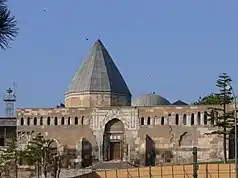 |
Konya | Initially completed around 1155, but rebuilt and expanded up until 1235[38] | Sunni | The oldest Seljuk mosque in Turkey.[39] | |
| Yivliminare Mosque (Alaeddin Mosque) |  |
Antalya | 1230 | |||
| Aslanhane Mosque |  |
Ankara | 1290 | |||
| Grand Mosque of Bursa (Ulu Camii) | 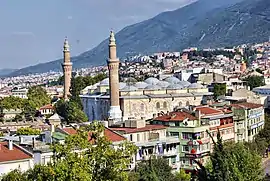 |
Bursa | 1396-1399[40] | Sunni | Major monument of early Ottoman architecture.[41] Significantly restored and repaired across its history.[40] | |
| Green Mosque (Yeşil Camii) | .jpg.webp) |
Bursa | 1419-1421 | Sunni | Important monument of early Ottoman architecture.[41] | |
| Fatih Mosque |  |
Istanbul | 1463-1470; but significantly rebuilt between 1766 and 1771 | Sunni | First Ottoman imperial mosque built in Istanbul, commissioned by Mehmet II Fatih. It was severely damaged by an earthquake in 1766 and rebuilt afterwards in a different style, though elements of the original mosque survive in the current building.[42] | |
| Süleymaniye Mosque | 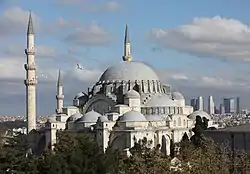 |
Istanbul | 1550-1557 | Sunni | One of the largest and most important works of Ottoman architecture and of architect Mimar Sinan, commissioned by Suleiman the Magnificent.[43] |
Iranian Plateau
| Building | Image | Location | Country | First built | Denomination | Notes |
|---|---|---|---|---|---|---|
| Jameh Mosque of Ferdows | Ferdows | 7th century (possibly) | ||||
| Jameh Mosque of Isfahan |  |
Isfahan | 771 | |||
| Jameh Mosque of Fahraj |  |
Fahraj | 700s[44] | |||
| Tarikhaneh Mosque |  |
Damghan | 8th century |
Transcaucasia
| Building | Image | Location | Country | First built | Denomination | Notes |
|---|---|---|---|---|---|---|
| Juma Mosque |  |
Shamakhi | 743-744 | |||
| Blue Mosque |  |
Yerevan | Mid-18th century |
Central Asia
| Building | Image | Location | Country | First built | Denomination | Notes |
|---|---|---|---|---|---|---|
| Po-i-Kalyan | 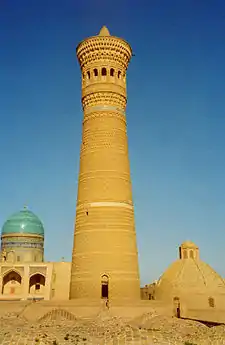 |
Bukhara | 713 | Since 713 here, several edifices of main cathedral mosque were built then razed, restored after fires and wars, and moved from place to place. |
South Asia
| Building | Image | Location | Country | First built | Denomination | Notes |
|---|---|---|---|---|---|---|
| Cheraman Juma Mosque | 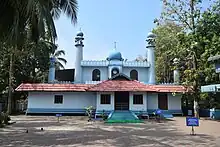 |
Kodungallur | 629 | Sunni, Shafi'i | Built by Malik bin Dinar, companion of Muhammad, on orders of Cheraman Perumal,[45] then King of modern-day Kerala, it is the oldest mosque in the Indian subcontinent.[46] | |
| unnamed Ramjapur Masjid | Lalmonirhat, Rangpur | Muhammad's lifetime | Sunni | Possibl the earliest mosque in South Asia is under excavation in northern Bangladesh, indicating the presence of Muslims in the area around the lifetime of the Prophet Muhammad.[47] | ||
| Palaiya Jumma Palli |  |
Kilakarai | 630 | Sunni | Considered to be the first mosque to be built in Tamil Nadu, and the second mosque in India. Constructed by Yemeni merchants and trade settlers in the Pandiya Kingdom and ordered by Bazan ibn Sasan, governor of Yemen at the time of Muhammad.[48] | |
| Masjid al-Abrar | Beruwala, Kalutara District, Western Province | First century in the Hijri calendar | The date has been carved in its stone pillars. It is situated in western province of Sri Lanka. | |||
| Haji Piyada | Balkh | Second half of the 9th century[49] | Considered to be the oldest Islamic building in Afghanistan.[49] | |||
| Jamia Masjid, Banbhore | _-_panoramio.jpg.webp) |
Banbhore, Sindh | 727 | This is the oldest mosque of Pakistan which is located in Bhambore.[50][51] | ||
| Kazimar Big Mosque |  |
Madurai | 1284 | Sunni, Hanafi Shadhili | First mosque in Madurai. | |
| Chaqchan Mosque |  |
Khaplu, Gilgit Baltistan | 1370 | This is the oldest mosque of Gilgit Baltistan located in Khaplu.[52][53] | ||
| Sixty Dome Mosque | Bagerhat | 1450 | Built by Khan Jahan Ali, it is considered to be the second-oldest mosque in Bangladesh. The fortified structure contains eighty-one domes, sixty stone pillars and eleven mihrabs. | |||
| Neevin Mosque | .jpg.webp) |
Lahore | 1460 |
Southeast Asia
| Building | Image | Location | Country | First built | Denomination | Notes |
|---|---|---|---|---|---|---|
| Istiqlal Mosque
Masjid Istiqlal |
Jakarta | 1975 | A national mosque and the largest mosque in Southeast Asia. | |||
| Wapauwe Old Mosque | 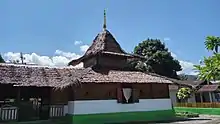 |
Kaitetu, Central Maluku Regency, Maluku | 1414 | The oldest surviving mosque in Indonesia. | ||
| Sheik Karimol Makhdum Mosque | Tubig Indangan, Simunul island, Tawi-Tawi province | 1380[54] | Founded by Makhdum Karim, who introduced Islam to the Philippines. | |||
| Ampel Mosque |  |
Ampel, Surabaya, East Java | 1421[55] | The oldest surviving mosque in Java, and second oldest in Indonesia. | ||
| Great Mosque of Demak |  |
Demak, Central Java | 15th century[56] | Oldest mosque in Central Java and second oldest in Java.[56] | ||
| Menara Kudus Mosque
Masjid Menara Kudus |
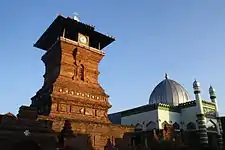 |
Kudus Regency, Central Java | 1549[57] | It preserves pre-Islamic architectural forms such as old Javanese split doorways, ancient Hindu-Buddhist influenced Majapahit-style. | ||
| Masjid Sultan Sharif Ali | Sengkurong | 1430 (approximate)[58] | Built under the direction of Sharif Ali ("Sultan Berkat"), who reigned 1425–1432. | |||
| 300 Years Mosque | .jpg.webp) |
Narathiwat | 17th century | It is at least one of the oldest known mosques in Thailand.[59] | ||
| Sultan Suriansyah Mosque
Masjid Sultan Suriansyah |
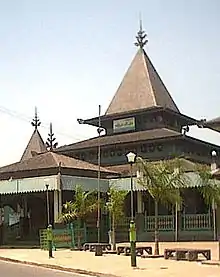 |
Banjarmasin, South Kalimantan | 1746[60] | Established in the 16th century, it is the oldest mosque in Borneo based on its year of establishment. The form of the building has been altered in the 18th century. | ||
| Baiturrahman Grand Mosque
Masjid Raya Baiturrahman |
 |
Aceh | 1881 | One of the oldest mosque in Aceh, the building survived the 2004 Tsunami | ||
| Hue Indian Mosque
Nhà thờ Hồi giáo Ấn Độ Huế |
 |
Thừa Thiên Huế province | 1921 | Located in Thừa Thiên Huế province, it was built in 1921 by Indian people. It is the mosque for Hue and Indian people,[61] since majority of Hue is muslims. | ||
| Grand Mosque of West Sumatra
Masjid Raya Sumatera Barat |
Padang, West Sumatra | 2014 | The most distinctive feature of the mosque is its roof form, a contemporary interpretation of the traditional roof of the Minangkabau vernacular houses. | |||
East Asia
| Building | Image | Location | Country | First built | Denomination | Notes |
|---|---|---|---|---|---|---|
| Huaisheng Mosque |  |
Guangzhou | 627 | The Huaisheng Mosque is the main mosque of Guangzhou. It has been rebuilt many times over its history. According to tradition it was originally built over 1,300 years ago in 627 CE by Sa`d ibn Abi Waqqas, who was an uncle of the Islamic prophet Muhammad, and was named in memory of Muhammad. | ||
| Xianxian Mosque |  |
Guangzhou City | 629 | The mosque was originally built in 629 during the Tang dynasty. | ||
| Great Mosque of Xi'an | 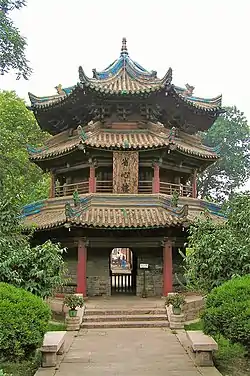 |
Xi'an, Shaanxi | 742[62] | Although the oldest stones date from the 18th century,[63] the Mosque was founded in 742[64] Built in 742, but oldest mosque in China is the Beacon Tower mosque of Guangzhou being built in 627.[65] | ||
| Jamia Mosque |  |
1890 | ||||
| Macau Mosque |  |
1980 | The first and only mosque in Macau. | |||
| Kobe Mosque |  |
Kobe | 1935[66] | Designed in the Turkish style by a Czech architect, confiscated by the Imperial Japanese Navy in 1943, and later returned. | ||
| Seoul Central Mosque | Seoul | 1976[67] | ||||
| Taipei Grand Mosque |  |
Taipei | 1947 | Oldest and most famous mosque in Taiwan. Original building was firstly used in 1947, then relocated to a new site where it was reconstructed in 1960. |
Africa
- List of mosques in Africa
- List of mosques in Algeria
- List of mosques in Egypt
- List of mosques in Morocco
Northeast Africa
| Building | Image | Location | Country | First built | Denomination | Notes |
|---|---|---|---|---|---|---|
| Masjid As-Sahabah | 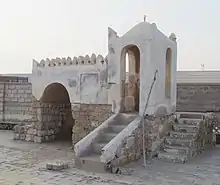 |
Massawa | 610-614 (approximate)[68] | Believed to be the first mosque on the African continent and the first mosque in the world built by Muhammad and his companions in the 7th century.[68] | ||
| Negash Amedin Mesgid |  |
Negash | 610-614 | Built in the 7th century in Negash, the mosque in Negash, by tradition burial site of several followers of Mohammad who, during his lifetime, fled to the Aksumite Kingdom to escape persecution in Mecca. | ||
| Masjid al-Qiblatayn |  |
Zeila | 620[69] | Built in the 7th century in Zeila, shortly after the hijrah; known to be among the oldest mosques. | ||
| Korijib Masjid | Tadjoura | 630-640 | Possibly the oldest mosque in the country. | |||
| Mosque of Amr ibn al-As |  |
Cairo | 641 | Named after 'Amr ibn al-'As, commander of the Muslim conquest of Egypt, by order of Caliph Umar. Built as the centre of Fustat (the newly founded capital of Egypt) in 673–642 CE, and rebuilt in 1179 and in 1875. | ||
| Mosque of Ibn Tulun | Cairo | 879 | ||||
| Al-Hakim Mosque | 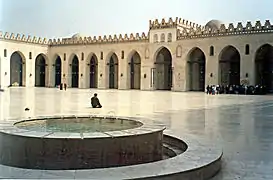 |
Cairo | 928 | |||
| Al-Azhar Mosque |  |
Cairo | 972 | Sunni | ||
| Arba'a Rukun Mosque |  |
Mogadishu | 1268/9 | Sunni | ||
| Fakr ad-Din Mosque |  |
Mogadishu | 1269 | Sunni | Mosque built by Sultan Fakr ad-Din of the Sultanate of Mogadishu (10th century – 16th century). | |
| Mosque-Madrassa of Sultan Hassan | 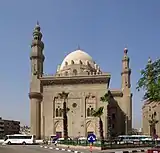 |
Cairo | 1356-1363 | Sunni | Most massive and most expensive mosque built in the Mamluk era of Egypt.[70][71] |
Northwest Africa
| Building | Image | Location | Country | First built | Denomination | Notes |
|---|---|---|---|---|---|---|
| Great Mosque of Kairouan
(Mosque of Uqba) |
 |
Kairouan | 670 | Sunni | Believed to be the first mosque in the Maghreb, it was rebuilt in the 9th century. | |
| Sidi Uqba Mosque |  |
Sidi Okba | 686[72] | Sunni | ||
| Al-Zaytuna Mosque |  |
Tunis | 709 | Sunni | ||
| Great Mosque of Sfax |  |
Sfax | 850[73] | Sunni | ||
| Great Mosque of Sousse |  |
Sousse | 851[74] | Sunni | ||
| al-Qarawiyyin | 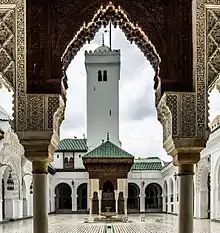 |
Fes | 859[75] | Sunni | Considered by many to be the oldest continuously operating university in the world.[76][77] | |
| Mosque of the Andalusians | 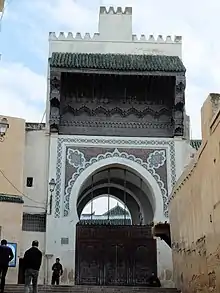 |
Fes | 859[78] | Sunni | Founded at the same time as the Qarawiyyin Mosque on the opposite shore of the Fes River. | |
| Atiq Mosque, Awjila | _-_The_Mosque_of_Atiq.jpg.webp) |
Awjila | 1101 | Sunni | ||
| Kutubiyya Mosque | 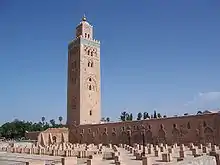 |
Marrakesh | 1147[79] | Sunni | After the completion of the first mosque, a second one was built right next to it, which is the one still standing today.[80] |
Southeast Africa
This grouping includes nearby islands of the Indian Ocean, but excludes countries that are also in Southern Africa.
| Building | Image | Location | Country | First built | Denomination | Notes |
|---|---|---|---|---|---|---|
| Shanga Mosque | Shanga, Pate Island | Foundation discovered, with coins attesting dates, during the 1980s excavations. The earliest concrete evidence of Muslims in East Africa.[81]: 97 | ||||
| Great Mosque of Kilwa | _(28963560112).jpg.webp) |
Kilwa Kisiwani | 1000-1100 | |||
| Kizimkazi Mosque |  |
Dimbani | 1107 (according to an inscription)[82] | |||
| Tsingoni Mosque |  |
Tsingoni, Mayotte | 1538[83] | |||
| Al-Fatah Mosque (Green Mosque) | Kigali | 1913[84] | Founded by coastal Swahili-speaking Tanzanian Muslims who came to Rwanda to work in the German administration.[84] |
Western-Central Africa
| Building | Image | Location | Country | First built | Denomination | Notes |
|---|---|---|---|---|---|---|
| Larabanga Mosque |  |
Larabanga | 1421 | The oldest existing mud-brick mosque in Ghana. | ||
| Great Mosque of Kano | Kano | 15th century | Built in for Emir Muhammad Rumfa |
Southern Africa
| Building | Image | Location | Country | First built | Denomination | Notes |
|---|---|---|---|---|---|---|
| Auwal Mosque |  |
Cape Colony | 1798[85] | |||
| Masjid al-Qudama | Caledon Street, Uitenhage, Eastern Cape | 1849[86] | It is deduced that the mosque in Caledon Street was a completed building by March 1849. | |||
| Grey Street Mosque (Juma Mosque) | -20140223.jpg.webp) |
Durban[87] | 1881 | |||
| Soofie Masjid | Butha Buthe | 1900 (approximate)[81]: 115 | Founded by Soofie Saheb at the turn of the century; the community is described as African Muslim yet speaking an Indian language.[81]: 115 | |||
| Habibia Soofie Saheb Jamia Masjid | 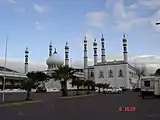 |
Rylands, Cape Town | 1905 | |||
| Lobatse Masjid | Lobatse | 1960s[88] | Founded by Indian Muslims who were brought over during the British colonial period. | |||
| Ezulwini Mosque | Ezulwini, near Mbabane | 1978[89] |
Americas
- List of mosques in the Americas
- List of mosques in the United States
- List of mosques in Canada
- List of mosques in Ottawa–Gatineau
- List of mosques in Mexico
- List of mosques in Brazil
South America
| Building | Image | Location | Country | First built | Denomination | Notes |
|---|---|---|---|---|---|---|
| 1906[91] | Built by immigrant Javanese rice farmers.[91] | |||||
| Mesquita Brasil (São Paulo), |  |
São Paulo | 1929[92] | Previous site built in 1929;[92] current building inaugurated in 1952. First known mosque in Brazil.[93] | ||
| 1930[94] | Built by the Ahmadiyya community.[94] | |||||
| El Paraíso, Caracas | 1968[95] | |||||
| At-Tauhid Mosque | Buenos Aires | 1983[96] | Shi'ite | Opened in October 1983 by the Shi'ite community of Buenos Aires and with the support of the Embassy of the Islamic Republic of Iran to Argentina. It is a very simple building with a subtle Islamic style in its facade.[97] | ||
| As-Salam Mosque |  |
Santiago | 1995[98] | Commissioned 1989, inaugurated in 1995. |
North America
This grouping includes Central America and island-states of the Caribbean Sea.
| Building | Image | Location | Country | First built | Denomination | Notes |
|---|---|---|---|---|---|---|
| Al-Sadiq Mosque | Chicago, Illinois | 1922 | ||||
| Mother Mosque of America (Moslem Temple) | Ross, North Dakota | 1934 | Built in Iowa in 1934, became the oldest standing mosque in America when the Ross Mosque was torn down in the 1970s. The Ross Mosque was later rebuilt in 2005. | |||
| Al-Rashid Mosque |  |
Edmonton, Alberta | 1938 | First purpose-built mosque. | ||
| Westmoreland and Spanish Town | 1950s[99] | Constructed by the Islamic Society of Jamaica, which was founded in 1950. | ||||
| 1985[100] | ||||||
| Suraya Mosque |  |
Torreón | 1989 | Built by the immigrants from the Middle East living in Torreón. | ||
| 1995[101] | Founded by the Islamic Cultural Association of Costa Rica. | |||||
| Belize City[102] | 2008 (approximate)[103] | Founded by Belizeans who converted to Islam while in the United States.[103] |
Europe
- List of mosques in Europe
- List of mosques in Albania
- List of mosques in Bulgaria
- List of mosques in Cyprus
- List of mosques in France
- List of mosques in Germany
- List of mosques in Georgia
- List of mosques in Hungary
- List of mosques in the Netherlands
- List of mosques in Russia
- List of mosques in Scandinavia (Denmark, Sweden, and Norway)
- List of mosques in Turkey
- List of mosques in the United Kingdom
British Isles
| Building | Image | Location | Country | First built | Denomination | Notes |
|---|---|---|---|---|---|---|
| Liverpool Mosque and Muslim Institute |  |
Liverpool, |
1891[104] | Liverpool Muslim Institute | Several sources state that a mosque was founded in 1860 at 2 Glynrhondda Street, Cardiff, Wales. This has been rejected by an academic paper as a transcription error.[105] | |
| Dublin Mosque and Islamic Centre | Dublin | 1976[106] | The first purpose-built mosque was built in Ballyhaunis in 1987. |
Western Europe
| Building | Image | Location | Country | First built | Denomination | Notes |
|---|---|---|---|---|---|---|
| Grand Mosque of Paris |  |
Paris (first in Metropolitan France) | 1926 | This mosque was the first mosque built in France since the 8th century; it was built in the Moroccan style, and honored Muslim French veterans of World War I.[107] | ||
| Wünsdorf Mosque |  |
Wünsdorf, Berlin | 1915 | Erected in 1915 by the Imperial German Army administration for Muslim Allied prisoners of war in the POW camp in Wünsdorf, later used as refugee camp. In 1930 torn down due to lack of a congregation. | ||
| Mobarak Mosque |  |
The Hague | 1955 | The first known purpose-built mosque in the Netherlands. | ||
| Centre Islamique de Genève ("Little Mosque" of Geneva) | Geneva | 1961 | Founded by Said Ramadan | |||
| Cologne Central Mosque |  |
Cologne | 2017 | Construction began 2009. The largest mosque in Germany.[108] | ||
| Great Mosque of Brussels |  |
Brussels | 1879 | Sunni Islam |
Iberian Peninsula
| Building | Image | Location | Country | First built | Denomination | Notes |
|---|---|---|---|---|---|---|
| Great Mosque of Cordoba (Mezquita) | .jpg.webp) |
Córdoba, Andalusia | 785[109] | It was built on the main (Visigothic) church of the city after the site was being divided and shared between Muslims and Christians for around seven decades. The great mosque was built by Abd al-Rahman I, the first Muslim ruler of Spain in 785,[110] it underwent successive extensions in the 9th and 10th centuries and was concluded in the 10th century under the command of Almanzor. After the Christian reconquest of Cordoba in 1236, Ferdinand III of Castile converted the mosque into a cathedral, suffering some alterations that will end up configuring the current Mosque-Cathedral of Cordoba. With 23,400 square metres (2.34 ha), it was the second largest mosque in the world on the surface, after Al-Haram Mosque in Mecca, only later replaced in this respect by the Sultan Ahmed Mosque, Istanbul in 1588. | ||
| Mosque of Cristo de la Luz |  |
Toledo, Castile-La Mancha | 999 (completed)[111] | |||
| Mosque of las Tornerías | 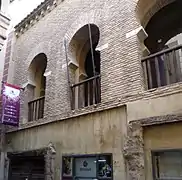 |
Toledo, Castile-La Mancha | mid-11th-century (completed)[112] | Arabic: الـمـسـتـمـيـم, romanized: al-Mustimim | ||
| Mosque of Tórtoles |  |
Tarazona, Aragon | 15th-century (completed)[113] | Almost not altered in the later centuries. |
Russia
| Building | Image | Location | First built | Denomination | Notes |
|---|---|---|---|---|---|
| Dzhuma Mosque | Derbent, Dagestan (then part of the Abbasid Caliphate) | 700-900 (approximate)[29] |
Eastern Europe
| Building | Image | Location | Country | First built | Denomination | Notes |
|---|---|---|---|---|---|---|
| Al-Agha Mosque | Dragaš | 1268[114] | Built by Muslims who migrated from Aleppo, in Syria, to Kosovo.[114] | |||
| Dzhumaya Mosque |  |
Plovdiv | 1363–1364 | Built during the reign of Sultan Murad II the old building was demolished and replaced by the modern-day mosque. | ||
| Sailors' Mosque | .jpg.webp) |
Ulcinj | 14th century | |||
| Halit Efendi Mosque | Slupčane, Lipkovo Municipality | 1415[115] | It is considered to be the oldest mosque in Macedonia.[115] | |||
| Turhan Emin-Beg Mosque | Ustikolina | 1448–1449[116] | Built by Turhan Emin-beg. Known to have been destroyed two times (1941 and 1992) and rebuilt two times (1956 and 2007).[116] | |||
| Fatih Mosque, Elbasan | Elbasan Castle | 1466[117] | Built by the orders of Sultan Mehmed II.[117] | |||
| Old Mosque, Plav (Imperial Mosque) |  |
Plav | 1471[118] | Built during the Ottoman rule in the city.[118] | ||
| King Mosque or Sultan Bayazit Mosque |  |
Elbasan | 1482 | |||
| Iljaz Mirahori Mosque |  |
Korçë | 1494[119] | It was built by Iljaz Hoxha, also known as Iljaz Bey Mirahor,[119] and is a Cultural Monument of Albania.[120] | ||
| Mosque of Kuklibeu |  |
Prizren | 1534 | |||
| Mosque of Muderis Ali Efendi | 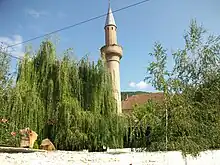 |
Prizren | 1543–1581 | |||
| Esmahan Sultan Mosque | Mangalia | 1575 | Oldest mosque in Romania | |||
| 1558 (earliest attestation in writing)[121] | Tatar mosques in Poland were noted in a 1558 treatise Risale-i Tatar-i Lech.[121] | |||||
| 1500-1600[122] | Various records indicate Lithuanian Tatars built mosques in the Duchy during the 16th century[122] | |||||
| Mosque of Sinan Pasha |  |
Prizren | 1615 | |||
| Log pod Mangartom Mosque |  |
Log pod Mangartom, Municipality of Bovec | 1916[123] | Built by Bosniak members of the Austro-Hungarian army.[123] | ||
| Gunja Mosque | Gunja | 1969 | The first and one of the few mosques in Croatia, located near the border with Bosnia and Herzegovina. | |||
| Vienna Islamic Centre-Mosque | _-_Moschee_(4).JPG.webp) |
Vienna | 1979[124] | |||
| Brno Mosque | .jpg.webp) |
Brno | 1998[106] | Construction began 1996, inaugurated 1998.[106] |
Nordic countries
| Building | Image | Location | Country | First built | Denomination | Notes |
|---|---|---|---|---|---|---|
| Järvenpää Mosque | 1942 | A mosque of the community of Finnish Tatars. It is considered to be the oldest mosque in Nordic countries. Finland's first Muslim cemetery was established in the 1830s for Russian troops.[125] | ||||
| Hvidovre, outside Copenhagen | 1967[125] | Founded by the Ahmadiyya; first purpose-built mosque in a Nordic country. | ||||
| Islamic Cultural Centre Norway | Oslo | 1974 | Founded by Pakistani-Norwegians aided by Danish Muslims; of the Sunni Deobandi school. The first Shi'i mosque, Anjuman-e Hussain, opened in 1975; the first Sunni Barelvi mosque opened in 1976. | |||
| Nasir Mosque, | Gothenburg | 1976 | ||||
| Stockholm | 2000[126] | Converted from Katarinastation, a former power station. | ||||
| Reykjavík Mosque | Reykjavik | 2002[127] | Not a purpose-built mosque, but serves as an interim gathering site. |
Oceania
Australasia
| Building | Image | Location | Country | First built | Denomination | Notes |
|---|---|---|---|---|---|---|
| Marree Mosque | Marree, South Australia | 1861[128] / 1882[98] | Small structure in the South Australian desert built by Australia's "Afghan" camel-drivers, has been restored. | |||
| Central Adelaide Mosque | Adelaide | 1888[128] | The oldest major city mosque in the country.[128] | |||
| Auckland | 1979 (begun)[129] | Cornerstone laid in 1979; the first Islamic centre in the country was installed in an Auckland house bought in 1959.[129] |
Melanesia
| Building | Image | Location | Country | First built | Denomination | Notes |
|---|---|---|---|---|---|---|
| Tavua Masjid | Tavua[130] | 1922 (approximate)[130] | A number of wooden mosques were built by local Islamic assemblies around 1922.[130] | |||
| Hohola Masjid (Islamic Society of Papua New Guinea Inc.) | Port Moresby[98] | 2000[131] | Islam was introduced to the island in the 1970s,[131] and the first Islamic centre established in 1988.[98] |
Notes
- According to historian Oleg Grabar, "It is only at a relatively late date that the Muslim holy space in Jerusalem came to be referred to as al-haram al-sharif (literally, the Noble Sacred Precinct or Restricted Enclosure, often translated as the Noble Sanctuary and usually simply referred to as the Haram). While the exact early history of this term is unclear, we know that it only became common in Ottoman times, when administrative order was established over all matters pertaining to the organization of the Muslim faith and the supervision of the holy places, for which the Ottomans took financial and architectural responsibility. Before the Ottomans, the space was usually called al-masjid al-aqsa (the Farthest Mosque), a term now reserved to the covered congregational space on the Haram, or masjid bayt al-maqdis (Mosque of the Holy City) or, even, like Mecca's sanctuary, al-masjid al-ḥarâm,"[17]
References
- Michigan Consortium for Medieval and Early Modern Studies (1986). Goss, V. P.; Bornstein, C. V. (eds.). The Meeting of Two Worlds: Cultural Exchange Between East and West During the Period of the Crusades. Vol. 21. Medieval Institute Publications, Western Michigan University. p. 208. ISBN 978-0918720580.
- Mustafa Abu Sway. "The Holy Land, Jerusalem and Al-Aqsa Mosque in the Qur'an, Sunnah and other Islamic Literary Source" (PDF). Central Conference of American Rabbis. Archived from the original (PDF) on 2011-07-28.
- Quran 2:144–217
- Quran 5:2 (Translated by Yusuf Ali)
- Quran 8:34 (Translated by Yusuf Ali)
- Quran 9:7–28
- Quran 17:1–7
- Quran 22:25 (Translated by Yusuf Ali)
- Quran 48:25–27
- Quran 2:127 (Translated by Yusuf Ali)
- Quran 3:96 (Translated by Yusuf Ali)
- Quran 22:25–37
- Mecca: From Before Genesis Until Now, M. Lings, pg. 39, Archetype
- Zeitlin, I. M. (2013-04-25). "3". The Historical Muhammad. John Wiley and Sons. ISBN 978-0745654881.
- Elad, Amikam (1995), Medieval Jerusalem and Islamic Worship Holy Places, Ceremonies, Pilgrimage, Brill, pp. 29–43, ISBN 978-90-04-10010-7
- "The Spiritual Significance of Jerusalem: The Islamic Vision. The Islamic Quarterly. 4 (1998): pp.233-242
- Grabar 2000, p. 203.
- Quran 2:129 (Translated by Yusuf Ali)
- Long, David E. (1979). "2: The Rites of the Hajj". The Hajj Today: A Survey of the Contemporary Pilgrimage to Makkah. SUNY Press. pp. 11–24. ISBN 978-0873953825.
With thousands of Hajjis, most of them in motor vehicles, rushing headlong for Muzdalifah, the potential is there for one of ... There is special grace for praying at the roofless mosque in Muzdalifah called al-Mash'ar al-Haram (the Sacred Grove) ...
- Danarto (1989). A Javanese pilgrim in Mecca. p. 27. ISBN 978-0867469394.
It was still dark when we arrived at Muzdalifah, four miles away. The Koran instructs us to spend the night at al-Mash'ar al-Haram. the Sacred Grove at Muzdalifah, as one of the conditions for the hajj . We scrambled out of the bus and looked ...
- Jones, Lindsay (2005). Encyclopedia of religion. Vol. 10. Macmillan Reference USA. p. 7159. ISBN 978-0028657431.
The Qur'an admonishes: "When you hurry from Arafat, remember God at the Sacred Grove (al-mash' ar al-haram)," that is, at Muzdalifah (2:198). Today a mosque marks the place in Muzdalifah where pilgrims gather to perform the special saldt ...
- Ziauddin Sardar; M. A. Zaki Badawi (1978). Hajj Studies. p. 32. ISBN 978-0856646812.
Muzdalifah is an open plain sheltered by parched hills with sparse growth of thorn bushes. The pilgrims spend a night under the open sky of the roofless Mosque, the Sacred Grove, Al Mush'ar al-Haram. On the morning of the tenth, all depart ...
{{cite book}}:|work=ignored (help) - Quran 9:108 (Translated by Yusuf Ali)
- Abdul-Ali (August 24, 2005), Jawatha Mosque in danger of going down, Al-Ahsa: Jafariya News
- Roger Wood (1975). An introduction to Saudi Arabian antiquities. p. 151. Retrieved 18 October 2010.
{{cite book}}:|work=ignored (help) - John, Lawton (1991), The Arab Heartland, vol. 42, Saudi Aramco World
- 611. UNESCO
- Darke, Diane (2010). Oman: The Brad Travel Guide. Bradt Travel Guides. ISBN 9781841623320. Retrieved 15 March 2015.
- Petersen, Andrew (2002-03-11). Dictionary of Islamic Architecture. Taylor & Francis. ISBN 9780203203873. Retrieved 15 March 2015.
- Middle East on a Shoestring. Lonely Planet Publications. 1997-01-01. p. 131. ISBN 9780864424075.
- "Remains of 1,000-year-old mosque reveal a rich past". The National. Emirates 24/7. 2018-09-10. Retrieved 2018-10-10.
- Power, Timothy (2018-09-13). "How a 1,000-year-old mosque in Al Ain anchors the UAE in human history". The National. Retrieved 2018-10-10.
- Eugene Harnan (21 August 2011). "Oldest UAE mosque holds onto its secrets".
- Mann, Sylvia (January 1, 1983). This is Israel: pictorial guide & souvenir. Palphot Ltd. ISBN 9789652800008 – via Google Books.
- The Arabahmet Mosque, Nicosia, North Cyprus
- Arabahmet (Arap Ahmet) Mosque in North Nicosia - Cyprus44, the north cyprus guide
- Magdalino, Paul, et al. "Istanbul: Buildings, Hagia Sophia" in Grove Art Online. Oxford Art Online. http://www.oxfordartonline.com. accessed 28 February 2010.
- Redford, Scott (1991). "The Alaeddin Mosque in Konya Reconsidered". Artibus Asiae. 51 (1): 54–74. doi:10.2307/3249676. JSTOR 3249676.
- "Alaeddin Külliyesi". Archnet. Retrieved 2020-04-25.
- "Bursa Ulu Cami | Archnet". archnet.org. Retrieved 2020-04-25.
- Kuban, Doğan (2010). Ottoman Architecture. Translated by Mill, Adair. Antique Collectors' Club.
- Sumner-Boyd, Hillary; Freely, John (2009). Strolling Through Istanbul: The Classic Guide to the City. Routledge.
- "Süleymaniye Complex". Grove Encyclopedia of Islamic Art & Architecture. Oxford University Press. 2009. p. 325.
- Friday Mosque Archnet. 8-1-2017.
- "1400-year-old mosque to be restored to its original form". The Hindu. June 29, 2011. Retrieved September 7, 2015.
- "INTERVIEW". www.iosworld.org. Archived from the original on 2018-10-04. Retrieved 2018-11-15.
- "Ancient mosque unearthed in Bangladesh". Al Jazeera English. 2012-08-18. Retrieved 2016-11-07.
- Gibb & Beckingham 1994, pp. 814–815 Vol. 4.
- "City of Balkh (antique Bactria) – UNESCO World Heritage Centre". Archived from the original on 2007-02-16. Retrieved 2014-10-18.
- "Mosque of Bhambore". www.discover-pakistan.com. Retrieved 17 September 2018.
- "First Mosque of South Asia". Pakistan Today. Retrieved 17 September 2018.
- "Chaqchan Mosque, Khaplu, Gilgit Baltistan". achinsights.tumblr.com. Retrieved 17 September 2018.
- "Chaqchan Mosque - Pakistan". Dunya News. Retrieved 17 September 2018.
- Erich Kolig; Vivienne S. m. Angeles; Sam Wong (1 March 2010). Identity in Crossroad Civilisations: Ethnicity, Nationalism and Globalism in Asia. Amsterdam University Press. pp. 201–. ISBN 978-90-8964-127-4. Retrieved 5 July 2012.
- Let's Go, Inc. Staff (2004). Let's Go Southeast Asia 9th Edition (illustrated ed.). Macmillan. ISBN 978-03123-35670.
- Florida, Nancy K. (1995). "5: The Demak Mosque: A Construction of Authority". Babad Jaka Tingkir: Writing the past, inscribing the future: history as prophesy in colonial Java. Durham, N. C.: Duke University Press. ISBN 978-0-8223-1622-0.
- Turner, Peter (November 1995). Java. Melbourne: Lonely Planet. pp. 78–79. ISBN 0-86442-314-4.
- Richmond, Simon (2010). Malaysia, Singapore & Brunei. Lonely Planet Publications. ISBN 9781741048872. Retrieved 15 March 2015.
- "300 Years Mosque". Archived from the original on 2014-11-29. Retrieved 2019-05-04.
- According to conversion of inscription in the door, which mentions the Hijri Year 1159, which is 1746 civil year.
- Caroline Herberlin (2019-04-14). "SEARCHING FOR HUE'S OLD MOSQUE". www.siteandspace.org. Archived from the original on 2023-03-13. Retrieved 2023-04-19.
- China By Shelley Jiang,pg. 274
- Fodor's China edited by Margaret Kelly, pg 618
- Geography of China: Sacred and Historic Places By Britannica Educational Publishing, pg. 181–182, Kenneth Pletcher
- Britannica Educational Publishing; Kenneth Pletcher (2010). The Geography of China: Sacred and Historic Places. Britannica Educational Publishing. p. 181. ISBN 9781615301829. Retrieved 2014-10-18.
- Farah, Caesar E. (1 February 2003). Islam: Beliefs and Observances. Barron's Educational Series. pp. 291–. ISBN 978-0-7641-2226-2. Retrieved 5 July 2012.
- Heon Choul Kim (2008). The Nature and Role of Sufism in Contemporary Islam: A Case Study of the Life, Thought and Teachings of Fethullah Gulen. pp. 1–. ISBN 978-0-549-70579-6. Retrieved 5 July 2012.
- Reid, Richard J. (12 January 2012). "The Islamic Frontier in Eastern Africa". A History of Modern Africa: 1800 to the Present. John Wiley and Sons. p. 106. ISBN 978-0470658987. Retrieved 15 March 2015.
- "Liste des premières mosquées au monde prophètique, rashidun et omeyyade selon les écris historique et les traces archéologiques". Histoire Islamique (in French). 2014-06-15. Retrieved 2017-09-24.
- Raymond, André (2000). Cairo. Translated by Wood, Willard. Harvard University Press. pp. 141–142.
- Behrens-Abouseif, Doris (2007). Cairo of the Mamluks : a history of the architecture and its culture (null ed.). London: I.B. Tauris. pp. 201–213. ISBN 978-1-84511-549-4.
- Sidi 'Uqba (mosque, minaret and tomb) Museum With No Frontiers. Retrieved 8-1-2017
- Great Mosque of Sfax. Museum with No Frontiers. Retrieved 8-2-2017.
- Great Mosque of Sousse. Museum with No Frontiers. Retrieved 8-1-2017.
- Terrasse, Henri (1968). La Mosquée al-Qaraouiyin à Fès; avec une étude de Gaston Deverdun sur les inscriptions historiques de la mosquée. Paris: Librairie C. Klincksieck.
- "Medina of Fez". UNESCO. Retrieved 31 July 2012.
- Esposito, John (2003). The Oxford Dictionary of Islam. Oxford University Press. p. 328. ISBN 978-0-1951-2559-7.
- Terrasse, Henri (1942). La mosquée des Andalous à Fès. Paris: Les Éditions d'art et d'histoire.
- Bennison, Amira K. (2016). The Almoravid and Almohad Empires. Edinburgh University Press.
- Deverdun, Gaston (1959). Marrakech: Des origines à 1912. Rabat: Éditions Techniques Nord-Africaines.
- Westerlund, David; Svanberg, Ingvar (1999). Islam Outside the Arab World. Psychology Press. ISBN 978-0-7007-1124-6.
- "Kizimkazi Mosque". ArchNet. Massachusetts Institute of Technology. Archived from the original on 2005-02-19. Retrieved 2010-09-04.
- Pauly, Martial (10 February 2011). "La mosquée de Tsingoni, la plus ancienne mosquée en activité de France (Tsingoni Mosque, the oldest active mosque in France)". Archeologie Mayotte, Océan Indien (in French). Retrieved 10 June 2017.
- Adekunle, Julius (2007). Culture and Customs of Rwanda. Bloomsbury. ISBN 9780313331770. Retrieved 15 March 2015.
- Tayob, Abdulkader (1999). Islam in South Africa: Mosques, Imams, and Sermons. University Press of Florida. pp. 24–. ISBN 978-0-8130-2485-1.
- le Roux, Schalk (June 2007). "The First Mosque: Caledon Street, Uitenhage" (PDF). Suid-Afrikaanse Tydskrif vir Kultuurgeskiedenis (South African Journal of Cultural History). 21 (1): 34. hdl:2263/5330.
- "Visit the Juma Masjid Mosque", Sa-venues.com, 1999–2018, retrieved 2018-05-15
- Boehm, Eric H. (2000-01-01). Historical Abstracts: Modern history abstracts, 1450-1914. American Bibliographical Center, CLIO. p. 71.
- Terdiman, Moshe (2013). Islam in Swaziland. Research on Islam and Muslims in Africa (RIMA).
- Melton, John Gordon; Baumann, Martin (2002-01-01). Religions of the world: a comprehensive encyclopedia of beliefs and practices. S - Z. ABC-CLIO. p. 1285. ISBN 9781576072233.
- Arabian American Oil Company; Saudi Aramco; Aramco Services (1987). Aramco world. Aramco. p. 67. Retrieved 5 July 2012. - Then, in 1902, Indonesian Muslims from Java arrived to cultivate Suriname's coastal rice fields, and four years later, the country's first mosque was built at Wanica.
- J. Gordon Melton; Martin Baumann (21 September 2010). Religions of the World, Second Edition: A Comprehensive Encyclopedia of Beliefs and Practices. ABC-CLIO. pp. 395–. ISBN 978-1-59884-204-3. Retrieved 5 July 2012.
- Mesquita Brasil: Nossa História in Portuguese.
- David Westerlund; Ingvar Svanberg (13 November 1999). Islam Outside the Arab World. Palgrave Macmillan. pp. 453–. ISBN 978-0-312-22691-6. Retrieved 5 July 2012.
- Westerlund, David; Svanberg, Ingvar (1999). Islam Outside the Arab World. St. Martin's Press. ISBN 9780312226916. Retrieved 15 March 2015.
- "Circuitos Halal". City of Buenos Aires. Archived from the original on December 26, 2018. Retrieved November 15, 2015.
- "Circuitos Halal". City of Buenos Aires. 2013-10-29. Archived from the original on December 26, 2018. Retrieved November 15, 2015.
- Florian Pohl (1 September 2010). Modern Muslim Societies. Marshall Cavendish. pp. 374–. ISBN 978-0-7614-7927-7. Retrieved 5 July 2012.
- Social and Economic Studies. 1999. Retrieved 15 March 2015.
- "Faith facts about Haitian New Yorkers". A Journey through NYC religions. Retrieved 15 March 2015.
- Guzmán, Roberto Marín (2000). A Century of Palestinian Immigration Into Central America. Editorial Universidad de Costa Rica. ISBN 9789977675879. Retrieved 15 March 2015.
- Muslim community officially opens Belize City Mosque
- Mwakikagile, Godfrey (June 2010). Belize and Its People. Continental Press. ISBN 9789987932214. Retrieved 15 March 2015.
- "Liverpool Mosque and Muslim Institute". Open University. Retrieved 19 May 2014.
- Gilliat-Ray, Sophie (July 2010). "The first registered mosque in the UK, Cardiff, 1860': the evolution of a myth". Contemporary Islam. 4 (2): 179–193. doi:10.1007/s11562-010-0116-9. ISSN 1872-0218. S2CID 145759796.
- Jorgen S. Nielsen; Samim Akgönül; Ahmet Alibasic (15 October 2009). Yearbook of Muslims in Europe. BRILL. pp. 169–. ISBN 978-90-04-17505-1. Retrieved 5 July 2012.
- Haddad, Yvonne Yazbeck; Smith, Jane I. (2002). Muslim Minorities in the West. Rowman Altamira. ISBN 9780759102187. Retrieved 15 March 2015.
- "How Recep Tayyip Erdogan seduces Turkish migrants in Europe". The Economist. 31 August 2017. Retrieved 2 September 2017.
- Kathryn Petras; Ross Petras (11 June 1996). World Access: The Handbook for Citizens of the Earth. Simon and Schuster. pp. 288–. ISBN 978-0-684-81016-4. Retrieved 5 July 2012.
- L. M. (February 27, 2014), La basílica de San Vicente Mártir, la primacía de lo cristiano, ABC
- Antonio Pareja (1999). Mezquita de Bab al Mardum, Cristo de la Luz, Toledo 999-1999. Fundacíon Cultura y Deporte Castilla-La Mancha, Junta de Comunidades de Castilla-La Mancha.
- Markus Hattstein; Peter Delius (2007). Islam. Arte y arquitectura. Tandem Verlag.
- Markus Hattstein and Peter Delius (2007), Mezquita de Tórtoles (Tarazona, ZARAGOZA), Tandem Verlag
- Sharr, KBI (March 2007). "Këshilli me xhaminë më të vjetër në rajon". DITURIA ISLAME, Revistë Mujore, Fetare, Kulturore e Shkencore. Nr. 200 (xhamitë nëpër këshillat e Kosovës): 50.
- "Џамијата на Бедр {{in lang|mk}}". Archived from the original on 2016-03-05. Retrieved 2019-05-04.
- "Najstarija dzamija u BiH - ..::USTIKOLINA::." Ustikolina. 26 August 2007. Retrieved 15 March 2015.
- "Xhamia e parë në Shqipëri (1466)". Orientalizmi Shqiptar. 14 December 2011. Retrieved 15 March 2015.
- "Obnovu zida dizdarevog grada" (PDF). Archived from the original (PDF) on 2014-01-12. Retrieved 2014-01-12.
- Albania Explorer Archived 2011-09-03 at the Wayback Machine
- "Religious buildings with the "Culture Monument" status". Republic of Albania National Committee for Culture. Archived from the original on July 6, 2011. Retrieved October 28, 2010.
- Polish Art Studies. Zakład Narodowy im. Ossolińskich. 1991-01-01. p. 40.
- Górak-Sosnowska, Katarzyna (2011). Muslims in Poland and Eastern Europe. Katarzyna Górak-Sosnowska. ISBN 9788390322957. Retrieved 15 March 2015.
- ALI H. Žerdin, Ali H. (20 August 2002). "Minaret nad Alpami". Mladina. Retrieved 15 March 2015.
- Hunter, Shireen; Hunter, Shireen T. (2002). Islam, Europe's Second Religion. Bloomsbury Academic. ISBN 9780275976095. Retrieved 15 March 2015.
- Kent, Neil (2005). Helsinki. Interlink Publishing Group Incorporated. ISBN 9781566565448. Retrieved 15 March 2015.
- Out, Time (2011). Time Out Stockholm. Time Out Guides. ISBN 9781846702303. Retrieved 15 March 2015.
- "Iceland". U.S. Department of State. Retrieved 15 March 2015.
- "Afghan cameleers in Australia – Australia's Culture Portal". Archived from the original on 2009-09-18. Retrieved 2014-10-18.
- Abdullah Drury (2006). Islam in New Zealand: the first mosque : a short history of the New Zealand Muslim Association & the Ponsonby Mosque. A. Drury. ISBN 978-0-473-12249-2. Retrieved 5 July 2012.
- M. Alī Kettani (1986). Muslim minorities in the world today. Mansell. p. 227. ISBN 978-0-7201-1802-5. Retrieved 5 July 2012.
- Taylor & Francis Group (September 2004). Europa World Year Book 2. Taylor & Francis. pp. 3363–. ISBN 978-1-85743-255-8. Retrieved 5 July 2012.

